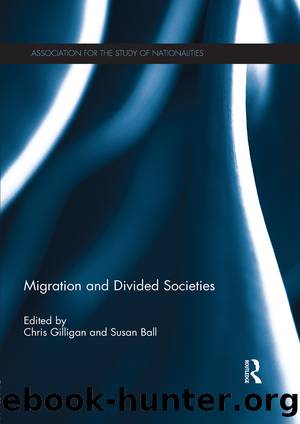Migration and Divided Societies by Chris Gilligan & Susan Ball

Author:Chris Gilligan & Susan Ball [Gilligan, Chris & Ball, Susan]
Language: eng
Format: epub
Tags: Political Science, General
ISBN: 9780415842662
Google: BSO3mAEACAAJ
Goodreads: 17803596
Publisher: Routledge
Published: 2013-07-19T00:00:00+00:00
To me, it is good, finally we are being recognized. But still, I mean the whole nation, and all the other tribes you know they cannot absorb. They know it is 42 ⦠But ah kind of it makes me feel like being somewhere. At least when people start talking about 42 tribes, I say no! Itâs 43, and my tribe is the 43rd tribe. And then when they say that, they kind of ask me, âHow? Who are you?âââI am a Nubian!â And then it gives me the opportunity to explain who Nubians are, how they came about.
Though the coding did not place the Nubians as 43rd of 43 tribes, but rather gave them code â220â, âAminaâsâ comments are testament to the salience of the perceived system of recognition and the desire to be included in that system. Issa Abdul Faraj, Chairman of KNCE (interview with author, 9 September 2009), echoes âAminaâ when he says, âthe government has recognised us as the 43rd indigenous tribe of Kenya, which means we are like everybody else, like the big tribes, the Kikuyu, the Luo, the Kalenjin, Maasai, you name them, Luhya. So you have the Nubians.â These comments explicitly raise what is particular about the case of Kenya; because the government already recognizes tribes, the claims of the Nubians for the same are nothing more than claims for equal treatment. A code in the census does not represent any special or preferential treatment, but rather puts their community on a par with others as part of the legitimate ethnic make-up of Kenya, entitled to the same understanding and resources afforded to other Kenyan tribes. This is indicative of the extent to which collective (tribal) recognition is necessary in Kenya for any sense of belonging to the nation.
Even in cases that initially suggest a rejection of tribal identity, the dynamic of recognition at play is more complex. A movement named âTribe Kenyaâ tried to convince people to identify their tribe as âKenyanâ, an option available for the first time in the 2009 census. This movement was supported by those who question the distinction between tribe and tribalism, believing tribes to be at the root of many of Kenyaâs problems. This anti-tribe, or at least anti-tribalist sentiment, has its place in the Nubian community as in any other, and some participants reported choosing âKenyanâ as their tribe. For example, âZeddyâ (interview with author, 1 October 2009) said, âIâll just tell them I am a Kenyan, because I am of course. I would just tell them Iâm a Kenyan. I wouldnât say Iâm a Nubian, and even if I say Iâm a Nubian, still Iâm a Kenyan, yeah?â âZeddyâ demonstrates what could be interpreted as a superior allegiance to her Kenyan identity, but she is quick also to defend her Nubian one, and their compatibility. In fact, she is confused as to why such compatibility would be contested. For âZeddyâ, being a Nubian simply is being a Kenyan.13
The choices people made to be counted,
Download
This site does not store any files on its server. We only index and link to content provided by other sites. Please contact the content providers to delete copyright contents if any and email us, we'll remove relevant links or contents immediately.
| Anthropology | Archaeology |
| Philosophy | Politics & Government |
| Social Sciences | Sociology |
| Women's Studies |
Cecilia; Or, Memoirs of an Heiress — Volume 1 by Fanny Burney(32523)
Cecilia; Or, Memoirs of an Heiress — Volume 2 by Fanny Burney(31928)
Cecilia; Or, Memoirs of an Heiress — Volume 3 by Fanny Burney(31912)
The Great Music City by Andrea Baker(31893)
We're Going to Need More Wine by Gabrielle Union(19019)
All the Missing Girls by Megan Miranda(15878)
Pimp by Iceberg Slim(14461)
Bombshells: Glamour Girls of a Lifetime by Sullivan Steve(14036)
For the Love of Europe by Rick Steves(13791)
Talking to Strangers by Malcolm Gladwell(13327)
Norse Mythology by Gaiman Neil(13312)
Fifty Shades Freed by E L James(13214)
Mindhunter: Inside the FBI's Elite Serial Crime Unit by John E. Douglas & Mark Olshaker(9283)
Crazy Rich Asians by Kevin Kwan(9255)
The Lost Art of Listening by Michael P. Nichols(7475)
Enlightenment Now: The Case for Reason, Science, Humanism, and Progress by Steven Pinker(7287)
The Four Agreements by Don Miguel Ruiz(6725)
Bad Blood by John Carreyrou(6597)
Weapons of Math Destruction by Cathy O'Neil(6243)
